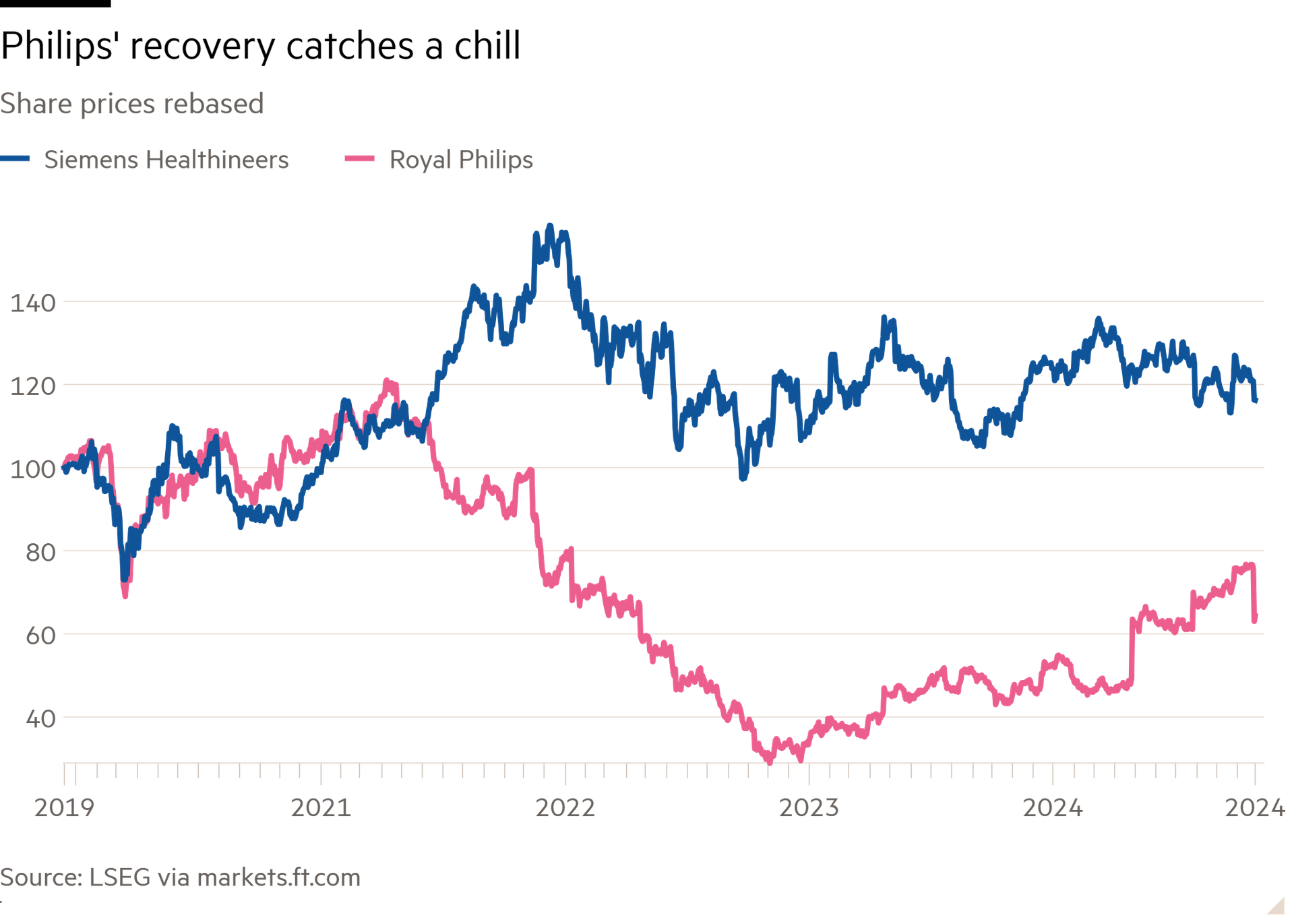尊敬的用户您好,这是来自FT中文网的温馨提示:如您对更多FT中文网的内容感兴趣,请在苹果应用商店或谷歌应用市场搜索“FT中文网”,下载FT中文网的官方应用。
Some companies, it seems, receive the benefit of the doubt even if their performance is a little ho-hum. They can, for example, highlight weak Chinese demand and get away with a mere share price ripple. Other stocks take a razor-sharp cut on every lump and bump.
有些公司似乎即使业绩平平也能得到宽容。例如,它们可以强调中国需求疲软,而只受到股价微小波动的影响。而其他股票则在每一次起伏中都遭受严重打击。
Philips is a case in point. Investors in the Dutch healthcare conglomerate, which makes everything from diagnostic machines to electric shavers, had until this week been enjoying a restorative patch. Legal woes over malfunctioning sleep apnoea machines had been resolved faster and more cheaply than feared, and sales seemed to be heading in the right direction.
飞利浦是一个典型的例子。这家荷兰医疗集团生产从诊断仪到电动剃须刀的各种产品,其投资者直到本周都过得不错。有关睡眠呼吸暂停症设备故障的法律纠纷解决得比预期更快更便宜,销售似乎也在朝着正确的方向发展。
But a stumble has undone much of the progress. Philips’ stock has fallen 15 per cent since it released soft third-quarter results on Monday. While Italy’s Agnelli family — who made a big investment in the stock in August 2023 through their public vehicle Exor — is still in the money, this week marks a blow for those who had more recently got behind Philips’ turnaround story.
但一个岔子使大部分进展付诸东流。自周一发布疲软的第三季度业绩以来,飞利浦股价下跌了15%。虽然意大利的阿涅利家族——在2023年8月通过他们的上市公司Exor对该股票进行了大量投资——仍在获利,但本周对那些最近相信飞利浦扭亏为盈的人来说是一个打击。

Investors must be wondering what exactly hit them. The issues Philips highlighted at third-quarter results are hardly unheard of. An anti-corruption drive at Chinese hospitals is slowing procurement of diagnostics machines — a headwind that drove guidance downgrades at rivals Siemens Healthineers and GE Healthcare after second-quarter results, points out Lisa Clive at Bernstein. And while a double-digit fall in personal care sales in China is surprising in its magnitude, the weakness of Chinese consumer demand has been widely flagged across industries.
投资者一定想知道到底是什么打击了他们。飞利浦在第三季度财报中强调的问题几乎闻所未闻。伯恩斯坦公司的丽莎•克莱夫指出,中国医院的反腐败运动正在减缓诊断设备的采购,这一逆风导致竞争对手西门子医疗和通用电气医疗在第二季度业绩后下调了指导。尽管中国个人护理销售额两位数的下降幅度令人惊讶,不过各行各业都能看到中国消费者需求的疲软。
Meanwhile, results outside China are strong. Operating margins remain healthy despite slower than expected sales. Philips does not look expensive, either. It trades on 15 times next year’s — reduced — earnings expectations despite double-digit EPS growth through to 2026, on Barclays estimates. Siemens Healthineers trades on more than 19 times.
与此同时,中国以外的业绩表现强劲。尽管销售增长速度低于预期,但运营利润率仍保持健康。飞利浦看起来也不贵。根据巴克莱的预测,尽管到2026年,飞利浦的每股收益将实现两位数增长,但其交易价格是明年预期收益——下调后——的15倍。而西门子医疗的交易倍数超过19倍。
The best explanation for the share price reaction is that Philips is suffering from sticky negative sentiment, a malady that can afflict companies that have severely spooked the market in recent history.
对股价反应的最佳解释是,飞利浦正遭受着粘性负面情绪的困扰,这种疾病可能会困扰那些在近期严重惊吓市场的公司。
Curing it requires not just solving one problem, no matter how major. It requires solving all of them. That’s something that GSK, reporting on Wednesday, will be acutely aware of. Following the resolution of the Zantac heartburn medicine legal overhang, analysts are now fretting over the strength of its vaccine sales.
要治好这种病,就不能只解决一个问题——不管它有多么重大——而是需要解决所有问题。周三发布报告的葛兰素史克公司将深刻认识到这一点。在解决了善胃得(Zantac)治疗胃灼热药物的法律纠纷后,分析师们现在又开始担心其疫苗销售的实力。
Traumatised investors require a long period of peace and quiet to recover their composure. Philips cannot afford another jolt to their nerves.
饱受创伤的投资者需要长时间的平静才能恢复冷静。飞利浦不能再让他们神经紧张了。